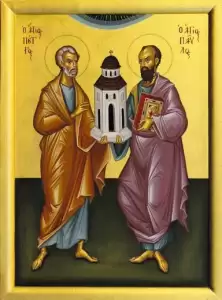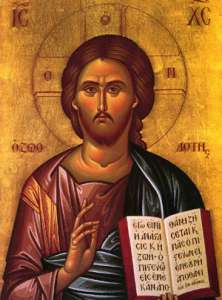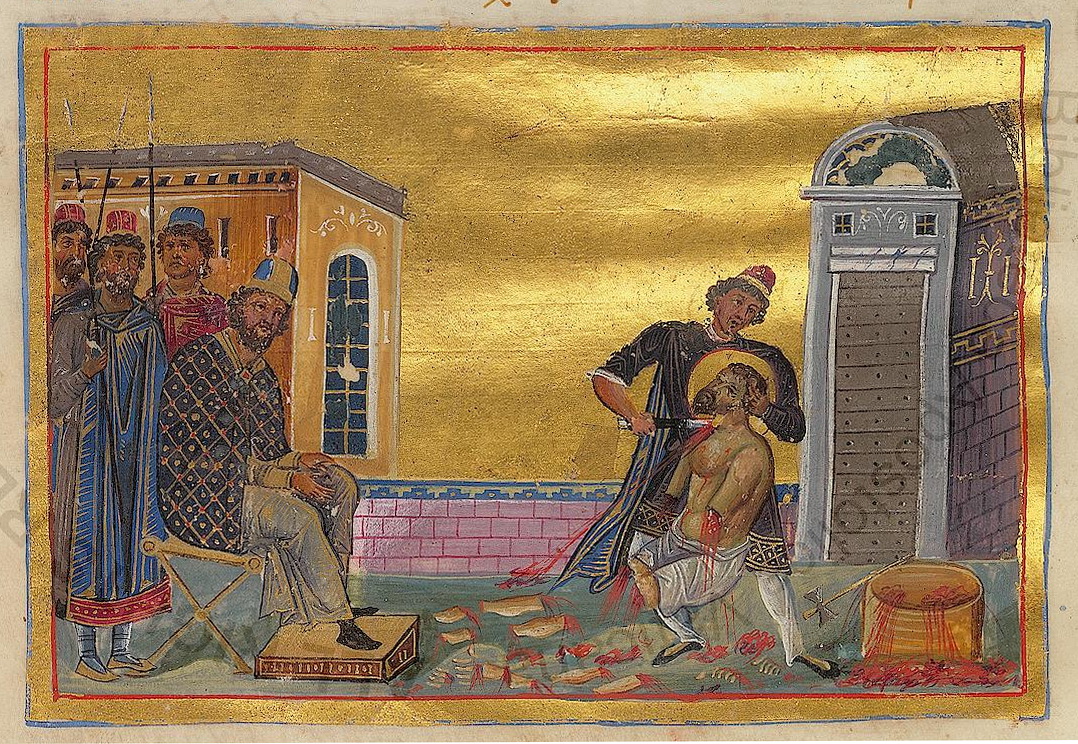Warning: Undefined array key "margin_above" in /home/stscahvallejo/public_html/wp-content/plugins/ultimate-social-media-icons/libs/controllers/sfsiocns_OnPosts.php on line 652
Warning: Undefined array key "margin_below" in /home/stscahvallejo/public_html/wp-content/plugins/ultimate-social-media-icons/libs/controllers/sfsiocns_OnPosts.php on line 653
Let us learn from this man not to call the rich lucky nor the poor unfortunate. Rather, if we are to tell the truth, the rich man is not the one who has collected many possessions but the one who needs few possessions; and the poor man is not the one who has no possessions but the one who has many desires. We ought to consider this the definition of poverty and wealth. So if you see someone greedy for many things, you should consider him the poorest of all, even if he has acquired every one’s money. If, on the other hand, you see someone with few needs, you should count him the richest of all, even if he has acquired nothing.”
St. John Chrysostom
For Sunday, November 27
 Epistle Reading
Epistle Reading
The reading is from St. Paul's Letter to the Ephesians 2:14-22
Brethren, Christ is our peace, who has made us both one, and has broken down the dividing wall of hostility, by abolishing in his flesh the law of commandments and ordinances, that he might create in himself one new man in place of the two, so making peace, and might reconcile us both to God in one body through the cross, thereby bringing the hostility to an end. And he came and preached peace to you who were far off and peace to those who were near; for through him we both have access in one Spirit to the Father. So then you are no longer strangers and sojourners, but you are fellow citizens with the saints and members of the household of God, built upon the foundation of the apostles and prophets, Christ Jesus himself being the cornerstone, in whom the whole structure is joined together and grows into a holy temple in the Lord; in whom you also are built into it for a dwelling place of God in the Spirit.
Christ unites us to one another and to the Father
In this epistle reading from St. Paul's letter to the Ephesians, he focuses on the peace, healing and unity that was accomplished by Christ. His letter was addressed to the church in Ephesus which had both Jews and Non-Jews/Gentiles as believers in Christ. And there was squabbling and power-struggles between them, one thinking himself superior to the other because of their ethnicity or religious background. But Christ comes to do away with any walls between people, whether economic, ethnic or religious. Instead, faith in the "One Lord Jesus Christ" and being in the "One Holy Catholic and Apostolic Church" makes us one as well. Human beings were divided from one another and separated from their heavenly Father. But through Christ and His Church, all people can be united to one another and to the Father. Because through Christ, the divine nature has been joined to the human nature. And Christ offers us his divine life through Holy Baptism and Holy Communion. In Christ and His Church, we share in "one baptism for the forgiveness of sins." We share in the one cup of the Holy Eucharist. which sanctifies us, cleanses us from sin, and unites us to Christ and to one another. And as Christ is the Son of God, we become sons and daughters of God, if we live a life of repentance that is worthy of the calling we have received, the salvation we have been given and the Heavenly Kingdom we have been invited to. On the other hand, we can receive the gift from God but later ignore it and neglect to cherish and protect it. We can be like the rich man in the gospel reading who wanted eternal life but didn't want to give up the pleasures and materialism of his earthly life.
 Gospel Reading
Gospel Reading
Luke 18:18-27
At that time, a ruler came to Jesus and asked him, "Good Teacher, what shall I do to inherit eternal life?" And Jesus said to him, "Why do you call me good? No one is good but God alone. You know the commandments: 'Do not commit adultery, Do not kill, Do not steal, Do not bear false witness, Honor your father and mother.' " And he said, "All these I have observed from my youth." And when Jesus heard it, he said to him, "One thing you still lack. Sell all that you have and distribute it to the poor, and you will have treasure in heaven; and come, follow me." But when he heard this he became sad, for he was very rich. Jesus looking at him said, "How hard it is for those who have riches to enter the kingdom of God! For it is easier for a camel to go through the eye of a needle than for a rich man to enter the kingdom of God." Those who heard it said, "Then who can be saved?" But he said, "What is impossible with men is possible with God."
Non-Possession bestows eternal life
Some think that this man was cunning and sought to trap the Lord with words. But this is not how he appears; rather, he was a lover of money, and Christ Himself rebuked him as such. Mark says that the man came running, and knelt before Jesus, and asked Him his question, and that Jesus, beholding him, loved him. [Mk. 10:17-22].
The man is a lover of money, and he approaches Jesus eager to learn how he, along with his wealth, might inherit eternal life. For there is no one who loves prolonged life as much as a man who loves money. Therefore this man thought that Jesus could show him some way in which he could live forever enjoying his possession of wealth. But when the Lord told him that non-possession is what bestows eternal life, he went away as if he regretted both his question and Jesus answer.
In his mind he needed eternal life for the very reason that he had great wealth. If he were to give up his possessions, why would he want eternal life, he thought, since that life was to be the life of a pauper? He approached the Lord as if the Lord were merely a man and a teacher. Therefore the Lord shows him that he ought not to approach Him in this manner, saying, None is good, save One, that is, God. By this He means, "You call Me good; why then do you also call Me a teacher? It appears that you think that I am one among many men. But if this were so, I would not be good, for no man is good in and of himself. Only God is. If you want to call Me good, you must call Me good because I am God; do not approach Me then as if I were merely a man. But if you think I am only a man, do not call Me good. For in truth God is good, and the source of goodness, and the first cause of goodness itself. If any man is good, he is not good in and of himself, but only because he receives a share of God's goodness. Moreover, what goodness a man has is changeable."
Because the young man said that he had kept the commandments from his youth, the Lord enjoins him to keep that commandment which stands at the head of all: non-possession. Behold the laws of the true Christian life. Sell all that thou hast, the Lord says. If anything remains, you are its slave. And distribute, not to your rich relatives, but unto the poor. I think that the word distribute implies that the meting out of wealth is to be done with discernment and not haphazardly. And because a man must have all the other virtues as well as non-possession, the Lord then said, And come, follow Me, meaning, "Be My disciple in all things, and always keep following Me. Do not follow Me today only, and leave Me tomorrow."
Because the ruler was a lover of money, the Lord promised him treasure in heaven, but the ruler did not give heed, because he was a slave of his money. Therefore when he heard what the Lord had asked of him, he was sorrowful. For the Lord had counselled him to deprive himself of his wealth; yet that was the very reason he wanted eternal life in the first place, so that he could live forever enjoying his many possessions. That he was sorrowful shows that he was sincere and not devious. Not one of the Pharisees was ever sorrowful; instead, they raged even more against the Lord when they heard His answers to their questions. I am not unaware that the great light of the world, John Chrysostom, believed that this young man truly desired eternal life, but that he was held fast by the love of money, a passion that was stronger than his love for eternal life. What we have said here is not inconsistent, namely, that the young man desired to have eternal life along with his wealth
St. Theophylact of Ochrid
Questions:
- Today is "Black Friday" and many people are out accumulating possessions. Can these possessions end up possessing us? How?

The Holy Great Martyr James the Persian
The Holy Great Martyr James the Persian (the Sawn-Asunder) was born in the fourth century into a pious Christian family, both wealthy and illustrious. His wife was also a Christian, and the couple raised their children in piety, inspiring in them a love for prayer and the Holy Scriptures. James occupied a high position at the court of the Persian emperor Izdegerd (399-420) and his successor Barakhranes (420-438). But on one of the military campaigns James, seduced by the emperor’s beneficence, was afraid to acknowledge himself a Christian, and so he offered sacrifice to idols with the emperor.
Learning of this, James’ mother and wife wrote him a letter, in which they rebuked him and urged him to repent. Receiving the letter, James realized the gravity of his sin. Faced with the horror of being cut off not only from his family, but also from God Himself, he began to weep loudly, imploring the Lord for forgiveness.
His fellow-soldiers, hearing him pray to the Lord Jesus Christ, reported this to the emperor. Under interrogation, Saint James bravely confessed his faith in the one True God. No amount of urging by the emperor could make him renounce Christ. The emperor then ordered the saint to be put to death.
They began to cut off his fingers and his toes one by one, then his hands and his feet, and then his arms and legs. During the prolonged torture Saint James offered prayers of thanksgiving to the Lord, Who had granted him the possibility of redemption from his sins by enduring these terrible torments. Finally, the martyr was beheaded. Christians gathered up the pieces of his body and buried them with great reverence.
Who were the Christians of Persia?
We read in the scriptures that the Magi who followed the star to find and worship the Christ-child all came from the "East", meaning the lands that were a part the ancient Kingdoms of Persia and Assyria in the regions of Mesopotamia.
According to the Acts of the Apostles there were Persians, Parthians, Medes and residents of Mesopotamia among the first new Christian converts at Pentecost. Since then there has been a continuous presence of Christians in what is modern-day Iran (ancient Persia) and Iraq (ancient Assyria).
During the apostolic age Christianity began to establish itself throughout the Mediterranean. However, a quite different Semitic Christian culture developed on the eastern borders of the Roman Empire and in Persia. Assyrian or Syriac Christianity owed much to preexistent Jewish communities and to the Aramaic language. This language had been spoken by Jesus, and, in various modern Eastern Aramaic forms is still spoken by the ethnic Assyrian Christians in Iran, northeast Syria, southeast Turkey and Iraq today.
From Persian-ruled Assyria (Assuristan), missionary activity spread Eastern-Rite Syriac Christianity throughout Assyria and Mesopotamia, and from there into Persia, Asia Minor, Syria, the Caucasus and Central Asia, establishing the Saint Thomas Christians of India and erecting the Nestorian Stele and the Daqin Pagoda in China.
Early Christian communities straddling the Roman-Persian border found themselves in the midst of civil strife. In 313, when Constantine I proclaimed Christianity a tolerated religion in the Roman Empire, the Sassanid rulers of Persia adopted a policy of persecution against Christians, including the double-tax of Shapur II in the 340s. The Sassanids feared the Christians as a subversive and possibly disloyal minority. In the early-5th century official persecution increased once more.
In the 19th century, Russian Orthodox missionaries established many churches in Iran but after the Communist revolution in Russia, the Orthodox Christians there were either massacred by the Turks and Kurds or fled to neighboring Georgia and Iraq. Yet Christianity has continued to exist in these ancient lands and is in fact a growing religion in Iran today. Many old churches also still remain in Iran from the early days of Christianity. Some historians regard the Assyrian Church of Mart Maryam (St. Mary) in northwestern Iran, for example, as the second-oldest church in Christendom after the Church of Bethlehem in the West Bank. A Chinese princess, who contributed to its reconstruction in 642 AD, has her name engraved on a stone on the church wall. The famous Italian traveler Marco Polo also described the church following his visit. It is located in the ancient city of Urmia (Orumieh). An Aramaic inscription inside the church states that it was built on the tomb of the three Magi who passed there on the way to Bethlehem to see the Christ-child.
The Jesus Prayer
The Jesus Prayer is very simple:
"Lord Jesus Christ, Son of God, have mercy on me a sinner,"
The Jesus Prayer according to numerous Church Fathers is "essential" to our spiritual growth. The Jesus Prayer proclaims our faith and humbles us by asking mercy for our sinfulness. The Jesus Prayer is thought to be as old as the Church itself.
The Jesus Prayer, says Metropolitan Anthony Bloom, “more than any other,” helps us to be able to “stand in God’s presence.” This means that the Jesus Prayer helps us to focus our mind exclusively on God with “no other thought” occupying our mind but the thought of God. At this moment when our mind is totally concentrated on God, we discover a very personal and direct relationship with Him.
Jesus Christ - the Power In the Name
The Jesus Prayer's power comes from the use of our Lord's Name, Jesus Christ, Son of God. It is a confession of our faith.
Jesus Prayer requires Humility
The Jesus Prayer is the prayer of the Orthodox Church. Its practice assumes you are a regular participant in the worship services of the Church, in her Sacraments and aware of your sinfulness. Be sure to consult with and follow the advice of your spiritual Father. Humility is a prerequisite for all prayer, especially the Jesus Prayer.
Jesus Prayer Has Two Functions
The Jesus Prayer has two important purposes. The first is worship, as with all prayer. The second is a discipline to help our soul gain control our overactive brains and create stillness so the Holy Spirit can work through us and help us live the virtues in union with God.
The Jesus Prayer Has Three Stages in Practice
The Jesus Prayer involves three stages of progress in its practice. You begin praying the Jesus Prayer by repeating the words of the prayer out loud or at least moving the lips. This is called verbal prayer. After some time saying of the Jesus Prayer becomes silent or mental and is repeated only in the mind. This is mental prayer. Finally, the Jesus Prayer becomes a continuous prayer in the heart, the inner core of our being. We begin with vocal prayer and do not force the move to mental prayer. This will happen naturally when you are ready and when God grants it.
Jesus Prayer in Practice
In praying the Jesus Prayer, our holy Fathers tell us, we say it over and over hundreds of times as part of our daily prayer rule. A prayer rope (komboskini) may be used to aid in keeping count and focus. It is best to add the Jesus Prayer to your morning prayers as this is when the mind is the quietest. Begin by saying the Jesus Prayer verbally focusing on each word. Repeat the Jesus Prayer continually for 15 minutes at first and then expand to 30 minutes. You will experience the challenge of dealing with your thoughts, the tendency for you mind to wander. Attention when praying the Jesus Prayer is important. Be sincere in your prayer and repeat it with contrition. Praying the Jesus Prayer is that simple!
Jesus Prayer is A Long and Difficult Path
Do not be fooled by its simplicity. The Jesus Prayer practice is a difficult task and like all ascetic practices it requires commitment of time, patience and perseverance. Remember the Jesus Prayer's aim is not to obtain a calmness or any kind of spiritual experience, but to become in communion with God and participate in His grace.
Jesus Prayer's Possible Problems Encountered and Cautions
You can expect to be bombarded with thoughts like a swarm of gnats. When your mind is distracted from the prayer by thoughts, and its will, be polite and gentle but firmly nudge your mind back to the concentration on the prayer and seeking God. When you recognize your mind is wandering do not let it continue on this path. Don’t accept even good thoughts. Let your soul take charge and move your focus back to the words of the prayer.
It is also possible that you may experience strong emotions during prayer. This can happen as you begin to find a deeper level of concentration and feel like you are about to enter in the place of the heart. If you are overcome with strong emotions simply open your eyes for a moment, make the sign of the cross and a few prostrations and then continue on with your prayer. If you experience tears this is a good sign, but do not delight in the tears. They are normally accompanied with a feeling of humility and contrition coupled with a profound love for God.
Another problem is seeing lights, images or even apparitions. They may even seem like bright ones. Saint Nil Sorski tells us,
“Do not permit yourself any concepts, images, or visions. For vivid images darting to and fro, and flights of fancy do not cease even when the mind stand in the heart and recites prayer: no one is able to rule over them, except those who have attained perfection by the grace of the Holy Spirit, and who have acquired stability of mind through Jesus Christ.” (Art of Prayer, p 101)
Saint Gregory the Sinaite warns similarly,
It must be completely imageless and we must on no account give freedom to the imagination or allow the fancy to form an image of any saint or light; because usually delusions, especially at the beginning deceive the minds of the inexperienced with false fantasies.
(Saint Gregory Sinaite, On the Prayer of Jesus by ignatius Brianchaninov, p 67)
The imagination is very strong and active. It will be stimulated by things in your memory. You may project into the future or dig back into unpleasant past. You want to dispel all images from your mind in prayer. Apparitions are especially dangerous. If you ever do have an apparition while praying, do not listen to, respond, or follow its direction, even if it is the Theotokos or your patron saint. Ignore it and immediately arrange to see your spiritual Father for advice. Any legitimate encounter will be surrounded with peacefulness and love and will return if it is legitimate. Such images are a common way the evil spirits work on us to mislead us. Often this work of the imagination will help us see a sinful past that we need to cleanse though the sacrament of Confession.
Jesus Prayer - When To Pray
The Jesus Prayer will eventually be prayed throughout the day and when this happens, you will find that your life changes.
Jesus Prayer is Not a Form of Eastern Meditation
The praying of the Jesus Prayer should not be confused with methods used in Eastern Yoga or meditation. In praying the Jesus Prayer as in all Orthodox Prayer we are seeking a relationship with a personal God based on faith and love (Source: orthodoxprayer.org)
Thank you for participating in SOFIA! If you've subscribed to our newsletter, look for an email notification next week when a new lesson page is posted. See you Sunday!

 Weekly catechism and spiritual devotion for the Orthodox home
Weekly catechism and spiritual devotion for the Orthodox home